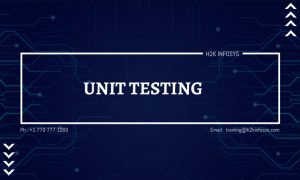In today’s rapidly advancing digital age, software testing has emerged as one of the most critical components of the software development lifecycle (SDLC). The demand for skilled software testing professionals is growing exponentially, driven by the increasing complexity of software products, rising customer expectations, and stringent quality standards. This heightened demand has made Software testing courses extremely popular among professionals and aspiring tech enthusiasts. But what precisely makes these courses so much in demand? Let’s explore this in-depth.
Rising Importance of Software Quality Assurance
As software applications have become integral to every sector from healthcare and finance to entertainment and retail the importance of ensuring their flawless performance cannot be overstated. A minor software glitch can lead to significant financial losses, compromised security, and even reputational damage. This underscores the crucial role of software testing in identifying defects before software reaches end-users.
Companies now acknowledge that investing in thorough testing significantly reduces long-term costs by preventing expensive fixes post-deployment. Consequently, professionals with software testing expertise have become invaluable assets, further escalating demand for specialized courses.
Diverse Career Opportunities
One primary reason software testing courses are immensely popular is the broad spectrum of career opportunities they open up. Individuals trained in software testing can assume various roles, including:
- Quality Assurance Analyst: Focused on evaluating software products to ensure compliance with specified requirements.
- Automation Tester: Specialized in writing and executing automated test scripts using tools like Selenium, TOSCA, or QTP.
- Test Manager: Responsible for overseeing the testing strategy, managing resources, and ensuring timely delivery of high-quality software.
- Performance Tester: Dedicated to testing software applications under specific performance parameters, such as speed, responsiveness, and stability.
The variety of roles available makes software testing appealing to professionals from diverse backgrounds.
Industry-Wide Demand
The software testing industry is experiencing a significant talent shortage, driving companies to actively seek skilled testers. According to recent market studies, software testing jobs are expected to grow faster than average technology roles, highlighting the pressing need for qualified professionals.
Businesses increasingly value certifications, practical skills, and structured knowledge, all of which are efficiently provided through dedicated software testing courses. As organizations prioritize hiring certified professionals, enrolling in these courses is becoming essential for career advancement.
Attractive Salary Packages
Software testing professionals are highly compensated, and this financial incentive is another factor fueling the popularity of software testing courses. The salary potential varies significantly based on experience, expertise, and geographic location but is generally very attractive.
For example, a software tester in the United States can expect an average annual salary ranging between $70,000 to $110,000, with senior roles commanding significantly higher salaries. These attractive compensation packages encourage more professionals and new entrants to consider a career in software testing, thereby driving demand for relevant courses.
Ease of Entry and Growth Potential
Unlike certain tech roles requiring extensive coding expertise, software testing offers a relatively accessible entry point for beginners and non-technical professionals. Entry-level testing roles often prioritize analytical skills, attention to detail, and foundational understanding gained from structured training.
Moreover, software testing courses equip learners with fundamental concepts and practical testing techniques, facilitating a smoother transition into the tech industry. Once established, professionals find ample opportunities for growth into more complex, technical, or managerial roles, enhancing the career longevity and attractiveness of this domain.
Comprehensive Curriculum
Software testing courses typically provide a robust and comprehensive curriculum covering both foundational and advanced topics. Key areas usually include:
- Basics of Software Testing (Manual Testing)
- Automated Testing (Selenium, UFT/QTP, TOSCA)
- Test Planning, Design, and Execution
- Defect Lifecycle Management
- Performance Testing (LoadRunner, JMeter)
- Agile and DevOps Integration
- Mobile and Web Application Testing
The comprehensive nature of these courses ensures that graduates are well-equipped with industry-relevant skills, further enhancing employability.
Practical, Hands-On Learning
Software testing courses emphasize hands-on, practical learning, significantly boosting their appeal. Practical assignments, case studies, real-world projects, and simulation environments ensure learners can apply theoretical knowledge effectively.
Real-world projects included in these courses provide invaluable experience, often mirroring industry conditions and practices. Hands-on practice with industry-standard tools and frameworks helps candidates become job-ready, increasing their confidence and employability.
Certification Value
Certifications play a crucial role in verifying the proficiency of professionals in the testing domain. Courses that offer recognized certifications like ISTQB (International Software Testing Qualifications Board), Certified Agile Tester, and Certified Software Tester (CSTE) are particularly sought after.
Certified software testers enjoy a competitive advantage in the job market, as certifications serve as credible indicators of skill and competence to employers. This factor substantially contributes to the high demand for software testing courses.
Increasing Adoption of Agile and DevOps Practices
The growing popularity of Agile and DevOps methodologies has significantly impacted software testing. These practices integrate continuous testing throughout the software development cycle, making testing a perpetual rather than isolated activity.
Software testers trained through specialized courses are adept at seamlessly integrating into Agile and DevOps teams, leveraging methodologies like Continuous Integration and Continuous Delivery (CI/CD). Consequently, organizations actively seek professionals proficient in these practices, creating a higher demand for training courses focused on Agile and DevOps testing.
Remote Work and Global Opportunities
The rise of remote work environments has expanded the job market for software testers significantly. Companies now frequently outsource testing tasks to global talent pools, broadening opportunities for certified testers. Professionals who complete software testing courses can easily adapt to remote work structures, further increasing the demand for such training programs.
Conclusion
In summary, software Quality assurance testing courses highly in demand due to the increasing reliance on high-quality software products, diverse career opportunities, attractive compensation, accessible entry paths, comprehensive curricula, and practical training components. Additionally, the growing emphasis on certifications, Agile and DevOps methodologies, and global employment opportunities have contributed significantly to their popularity.
Whether you are just starting your career or looking to upskill, investing in a robust software testing course is an effective strategy to enhance your career prospects and capitalize on the growing opportunities in the tech industry.

























